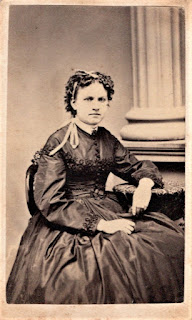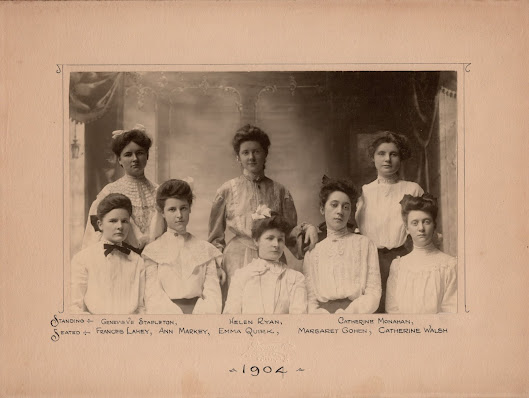Eleanora Underwood was born in Memphis, Tennessee in 1841. She was the second daughter of Albert G. Underwood, a plasterer, and his wife Joannah. She had one older sister, Eliza, and three younger sisters, Martha, Alice, and Ida. Albert died in 1855 when Eleanora was 14. Probate records tell us that upon his death, Albert owned 7 people: Henry, a 35-year-old plasterer and his wife Agnes, 16-year-old Jo, 11-year-old Henry, 35-year-old Scippio, 40-year-old Charlotte (described as "sickly") and Robert, "aged about 52 years." Though their mother was still alive, Eleanora and her sisters were placed in the care of another couple, Paul and Eleanora Kay.
According to law, Eliza and Eleanora should have had a say in the matter as they were both 14 years of age and older at the time of their father's death. The Kays appointed themselves as the children's guardians without consulting either of the two eldest daughters. Paul Kay, like their father, was a plasterer and it is likely the two men worked together. In order to pay off debts after Albert's death, all of the enslaved people he owned were sold. The remaining money was to go to the girls. As the Underwood girls were minors, their inheritance was given to their guardians- in this case, the Kays. Eliza and Eleanora stated in their petition that Paul Kay "does not profess to take any duties in the said guardianship to which he had been appointed" and that his wife Eleanora's treatment of the girls "had not been of that kind, bland, and maternal character which they had been prepared to expect or taught to believe formed the duty of a guardian." Instead, they suggested that Sylvester Bailey, Esq., would make a more suitable guardian. Bailey was a lawyer from New York who, in 1846, had been elected mayor of South Memphis and later became a judge. How the girls knew Bailey, I'm not sure. Was he a family friend? Simply a trusted figure in the community? Maybe they were friends with his daughters, Laura, Rosella, and Eveline. Their request was granted and Sylvester Bailey became their guardian.
Not long after they petitioned to be removed from the care of the Kays, both girls found husbands. In July 1856, Eliza married druggist Richardson Brewster. Her mother Joannah, as well as her three youngest sisters, all moved in with them. Eleanora, at 16, was married the following year to William H. Fitch. The decision to marry made sense, as it would have provided both of the eldest Underwood daughters with the stability their lives lacked. Eleanora's life, however, was about to change drastically.
She grew up in a largely slave-holding state. Her father owned enslaved people. Sylvester Bailey, the man who was briefly her guardian, also owned enslaved people. Yet William H. Fitch, the man she married, was an abolitionist, a Radical Republican, and staunchly pro-Union. There's no way of knowing what Eleanora's personal views were. If she had political opinions of her own, she had little opportunity to voice them. William Fitch, on the other hand, was extremely vocal on these matters.
Fitch became the president of the Memphis Gas company and was a respected member of the community. Though he had no political experience, he was outspoken on the issues that mattered to him. In November 1867, at the encouragement of his friends, William announced that he would be running for mayor. Though he was generally considered a "man of integrity," his radical views made him an unpopular candidate from the start. Memphis newspapers were littered with brutal attacks on his character, primarily his support of equal rights for African Americans. The Memphis Daily Post described him as "one of that contemptible crew who not only asserts their belief openly in the doctrine of social equality with the negro, but practices it." While her husband pursued a political career, Eleanora was left at home to care for their three young children, William Hayes Jr. (born 1859), Mollie (born 1860), and Alice (born 1863). Ultimately, William did not win the election.
The family moved to Detroit, Michigan around 1871, where William became president of the Mutual Gas Company. The Fitches lived on Jefferson Avenue, where they were eventually joined by Eleanora's mother and her youngest sister, Ida, who was now 24. The family also employed 3 servants: Thomas Bruce, Mariah Robertson, and Georgia Morton. On January 11th, 1880, the oldest Fitch daughter, Mollie, passed away from tuberculosis. She was only 20 years old. Fours years later, Eleanora would face yet another loss. On October 7th, 1884, William H Fitch died at the age of 55. Michigan death records list his cause of death as "unknown," though his obituary in the Detroit Free Press speculated it was caused by "progressive paralysis" due to overwork. The obituary described William as "a good fighter, a hard hitter, and...had many and bitter enemies."
Eleanora is photographed here in mourning. She did not remain a widow for long, however.
I will cover the rest of Eleanora's story in my next post. If you know who this may be, let us know!





















